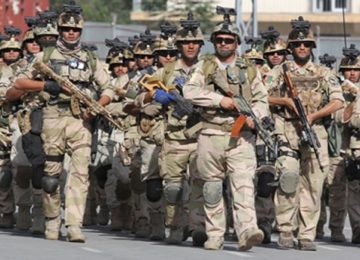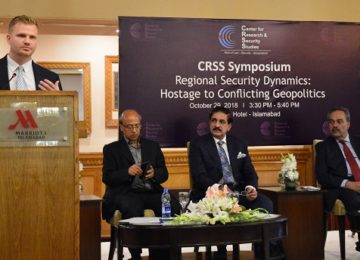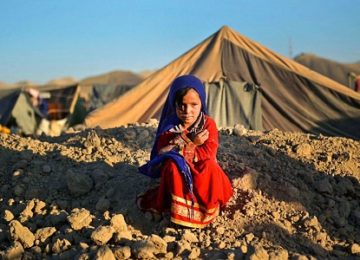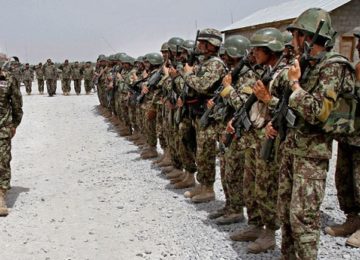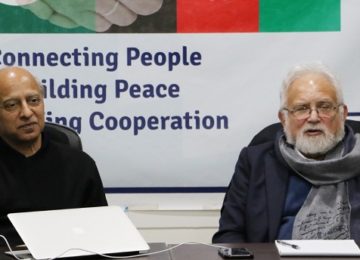April 10, 2018
The Muslim World is faced with many challenges and one of the pressing questions of the contemporary era remains whether Islam is essentially a political or an apolitical religion. This question was posed to young Afghans and Pakistanis by Farman Kakar, an academician and a writer, invited as the Chief Guest and Speaker at the 9th Pak-Afghan Youth Training Workshop at the Center for Research & Security Studies (CRSS) held on Monday, April 09, 2018.

Participants of the workshop included young Afghans and Pakistanis enrolled in undergraduate and graduate programmes at Quaid-i-Azam University (QAU), National Defense University (NDU), International Islamic University, Islamabad (IIUI), Bahria University, and National University of Modern Languages (NUML) in Islamabad.

Speaking on the theme of ‘Political Islam in Contemporary Times,’ he stated that, while Islam is a divinely revealed religion dealing with religious aspects of human life, scholars also refer to it as a ‘Deen’ – where the religion lays out a complete way of life entailing all personal, social, economic and political spheres. In the contemporary world, while Islam is both partially a political and apolitical system of beliefs and practices, it does not allow non-state actors to have monopoly over the use of force.
Categorizing the typologies of Islam in this respect, Mr. Kakar stated that political Islam claims to power by proposing the implementation of the religion as a system of government; either through violent or non-violent means. This is done by Islamists who can be democratic, in case of non-violent and legal methods to establish an Islamic system, or militant, those who use violent means to achieve their objectives. He cited several examples of these groups from both Pakistan and Afghanistan as well as the Middle East; including that of ISIL, Taliban, JUI etc. He also stated that Islam also has an apolitical aspect where the religion is considered as one’s private affair. The precedence of these two categories, he stated, are found in the Islamic history during the life of the Prophet Muhammad (p.b.u.h), in the form of manifestations such as the State of Medina which was a system of governance based on Islamic principles.
Viewed through the lens of academic discourse, he stated that the phenomenon of political Islam has been studied by several western philosophers resulting in two schools of thought on the matter; one being the confrontationists and the other, the accomodationists. ‘Confrontationists’, he stated, see the clash between the West and Islam as inevitable due to the immense differences that exist in the opposing cultures, values, and institutions of the two. ‘Accommodationists’, on the other hand, perceive that the rise of political Islam in the contemporary times is due to the West’s ill-suited policies towards Muslim countries, such as in Iraq, Afghanistan, etc. They believe that in the absence of such policies, Muslims and the West can co-exist and precedence of this can be found in Islamic history where the Muslims and the Jews co-existed.
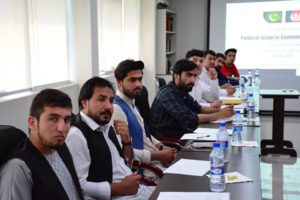
In the Q/A session, participants raised several questions regarding the motives for the rise of political Islam in Muslim countries and why the West views the political dimension of Islam as a threat, as well as also who is the real authority to speak for Islam in the contemporary era. Responding to the questions raised by the participants, the trainer opined that no non-state actor can speak for Islam today. He gave the examples of the ISIL, Taliban, and other insurgent groups that wrongly used religion to acquire support and political power for their interests. He stated that it can only be when a state is completely Islamic, which does not include the Muslim majority states, which can speak for Islam. As such, there is no country that can claim to be completely Islamic in practice today. Furthermore, Islam does not permit non-state actors to speak for Islam which would only result in chaos.

Responding to a question, the trainer also said that the motives behind the rise of political Islam in Muslim countries also varies from state to state. However, in all cases, a common element is that the use of Islam for political power is rather a rational action to pursue certain vested interests and not actually to establish an Islamic state.
Saddam Hussein, Program Officer at Afghan Studies Center, who was moderating the session, apprised the participants about the ongoing CRSS Pak-Afghan Track 1.5/II Initiative ‘Beyond Boundaries’ which is aimed at improving bilateral relations and bridging the gulf of mistrust between Pakistan and Afghanistan. He further told the participants that the idea of Afghan Studies Center emerged as an off-shoot of the above mentioned initiative, exclusively to provide the youth of both countries to interact, exchange ideas and engage in joint research ventures. CRSS Executive Director Imtiaz Gul, who delivered the opening remarks, highlighted the significance of such youth forums to inculcate critical thinking. He stated that these forums also serve as a bridge between the people of Pakistan and Afghanistan in mitigating the growing resentment in recent years. This was the 9th workshop of Afghan Studies Center that aims at bringing the youth of Afghanistan and Pakistan together on the same platform and build their knowledge and capacity on various subjects of significance for both countries.

The workshop concluded on the note that the question as to who speaks for Islam may not have a definite answer due to the diverse schools of thoughts in Islam. At the end, Mr. Saddam Hussein presented a shield of appreciation to the chief guest for his insightful training session, followed by a group picture of all participants with the Chief Guest.
© Center for Research and Security Studies (CRSS) and Afghan Studies Center (ASC), Islamabad.




